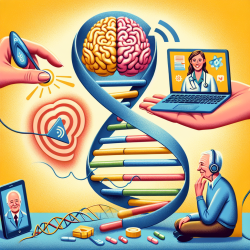Introduction
In the realm of speech-language pathology, understanding the genetic underpinnings of neurodegenerative disorders like Alzheimer's disease can significantly enhance therapeutic approaches. A recent case report titled Case Report of a 63-Year-Old Patient With Alzheimer Disease and a Novel Presenilin 2 Mutation sheds light on a novel PSEN2 mutation. This mutation, found in a 63-year-old patient, provides valuable insights into the genetic landscape of Alzheimer's disease, particularly its early-onset form (EOAD). By integrating these findings into clinical practice, practitioners can improve outcomes for children and adults affected by genetic mutations.
Understanding the Case Report
The case report details the clinical journey of a 63-year-old woman diagnosed with Alzheimer's disease, revealing a novel PSEN2 mutation. This mutation involves an adenosine replacing cytosine at codon 222, nucleotide position 665, resulting in lysine replacing threonine. Such mutations in the presenilin genes are known to affect the gamma-secretase enzyme, altering amyloid precursor protein (APP) processing and increasing the production of amyloid-beta 42, a more amyloidogenic form. This genetic insight is crucial for practitioners aiming to tailor interventions based on genetic profiles.
Implications for Speech-Language Pathologists
For speech-language pathologists, understanding the genetic basis of Alzheimer's can inform the development of targeted therapeutic strategies. Here are some key takeaways:
- Personalized Therapy: Recognizing genetic mutations allows for the customization of therapy plans, addressing specific cognitive and communicative challenges associated with Alzheimer's.
- Early Intervention: Genetic insights can facilitate early diagnosis and intervention, potentially slowing disease progression and preserving communication skills.
- Collaborative Care: Genetic findings highlight the importance of interdisciplinary collaboration, encouraging speech-language pathologists to work closely with geneticists and neurologists.
Encouraging Further Research
While the case report provides a significant leap in understanding Alzheimer's genetic basis, it also underscores the need for further research. Practitioners are encouraged to explore the following areas:
- Broader Genetic Studies: Conducting large-scale studies to identify additional genetic mutations and their impact on speech and language functions.
- Longitudinal Research: Following patients over time to assess the long-term effects of genetic mutations on communication abilities.
- Innovative Therapies: Developing novel therapeutic approaches that incorporate genetic findings to improve patient outcomes.
Conclusion
Integrating genetic insights into speech-language pathology practice can revolutionize care for Alzheimer's patients. By understanding and applying the findings from the case report on the novel PSEN2 mutation, practitioners can enhance therapeutic outcomes and contribute to the broader field of neurodegenerative research. To read the original research paper, please follow this link: Case Report of a 63-Year-Old Patient With Alzheimer Disease and a Novel Presenilin 2 Mutation.










